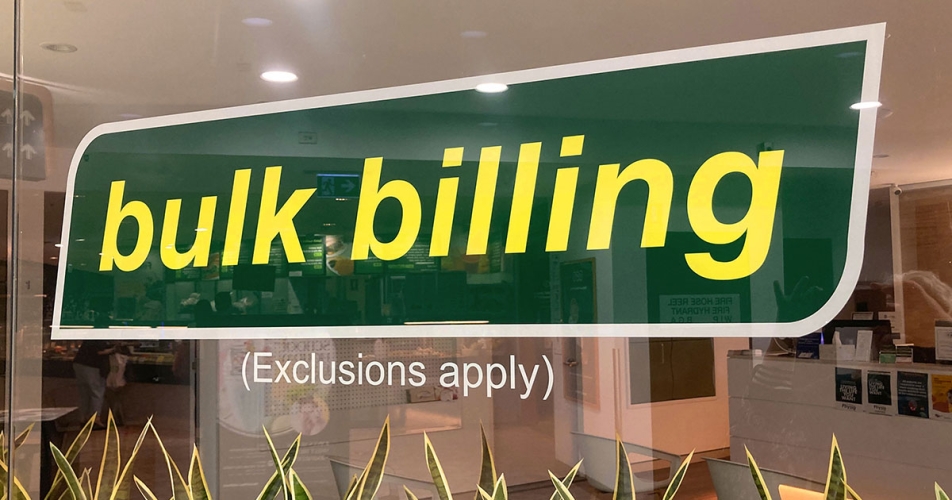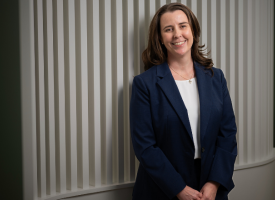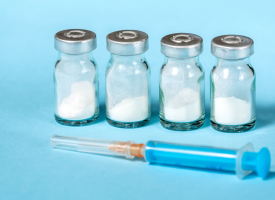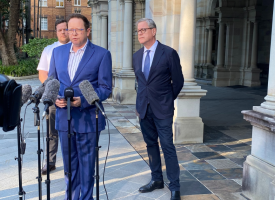GPs paying the price to bulk bill
All doctors would love to be able to bulk bill 100 per cent of their patients, but unfortunately, this isn’t possible because the Medicare rebate hasn’t kept up with inflation, AMA Queensland President Dr Nick Yim told 4BC Radio. "Some practices operate on very low margins, and if they choose to bulk bill 100 per cent of their patients as per the government's current plan, they potentially will be losing money."

Transcript: AMA Queensland President Dr Nick Yim, 4BC Radio, Breakfast with Luke Bradnam, Thursday 24 April 2025
Subjects: Bulk billing, Sangster Review
LUKE BRADNAM: Prime Minister Anthony Albanese made a big deal out of Medicare in the lead up to this election. Remember when he was using the Medicare card as a prop for the first couple of days? Well, no Medicare card in sight yesterday when Health Minister Mark Butler was forced to clarify that there will still be some patients who are charged a gap fee at the GP. Meanwhile, at the state level, the LNP government is scrambling to redraw Queensland's hospital building plans. There is plenty happening in the world of health. On the line, I have Australian Medical Association Queensland President Dr Nick Yim to talk us through it. Doctor, good morning to you.
DR NICK YIM: Good morning, Luke.
LUKE BRADNAM: Where do we start? The front page of the paper? Or why don't we start with Medicare, doctor? Mark Butler yesterday said they think that they can get 90 per cent of GPs to start bulk billing. Here he is yesterday on the Today Show.
MARK BUTLER: We said that our investment would mean that three quarters of practices would be better off becoming fully bulk billing practices. I know, and I've admitted from the day we announced this, that there will be practices, particularly in wealthier suburbs in our cities, that choose instead to charge large gap fees to wealthier patients.
LUKE BRADNAM: Is this a step backwards, doctor, from what we were promised? I think this is really challenging.
DR NICK YIM: I think when the government first made their announcement at the very start of the campaign - AMA Queensland, we've always said that it's quite unlikely that all GPs, or 90 per cent of GPs, will be bulk billing. I must remind listeners that bulk billing occurs when the doctor's fee is the same as what the patient's Medicare rebate is. When we surveyed our members, they told us that if they choose to universally bulk bill, that's actually going to be a loss of 20 to 30 per cent of their revenue. In this current climate, if you ask any business owner, any workplace, it's very unlikely that they could survive if they had a 20 to 30 per cent reduction in revenue.
LUKE BRADNAM: So what's a realistic percentage then, you think, regardless of who is returned? What do you think a realistic expectation that we can expect will bulk bill this time next year?
DR NICK YIM: This time next year, it's very unlikely. The key thing here is that the actual rebate itself, due to successive federal governments, they've actually kept it on hold for nearly a decade. This is where the big issue is. We know that our population is getting older, it has more chronic disease and those consultations are becoming more complex, which is a reason why, to benefit patients on a scale, it would be wiser to invest those dollars into the patient's Medicare rebate and ensure that is protected moving to the future.
LUKE BRADNAM: Do you think we could get to a stage where 50 per cent [bulk bill]? Because at the moment, it's very difficult for some of our listeners to find anybody who's bulk billing.
DR NICK YIM: Absolutely, and listeners must be aware that each general practice, they are a private business and will have slightly different models of care. Some of them will have more of a team care base – so, many of them are an employee, an exercise physiologist, a physio, more nursing teams – all part of their care. It depends on the model of care, which is why the costs are a little bit different from practice to practice and is the reason why we feel that investment into rebates and team-based care is more important to manage the chronic disease of our growing population.
LUKE BRADNAM: Okay, let’s have a look at a state level now. The Sangster Review has shown some serious flaws in the former Labor Government’s Health Infrastructure Plan. Its revving it up, they’re starting again. Do you believe that's the right move?
DR NICK YIM: We acknowledge the current government has challenges with budgets, but we welcome their commitment to delivering the beds because, as we all know, across the whole state of Queensland, there are bed shortages. When there's shortages of hospital beds, it affects the flow through the healthcare system. So, people can't travel through the nursing department, they can't get their elective surgery and obviously when people are waiting longer, complications arise down the track.
It's definitely welcome to see the investment into the beds, but at the same time it's really important that we are investing in our workforce. We all know that we're in a workforce shortage across Queensland, and when they're short of staff – doctors, nurses, healthcare professionals – that adds additional pressures to staff and causes them to burn out.
LUKE BRADNAM: So, this review though, it looked at 15 projects, 14 of them were underfunded and poorly planned. How does the government clean up this mess and do you have faith in the new government? You clearly couldn't in the previous government, but how are you finding the new government?
DR NICK YIM: I think the key thing here is, AMA Queensland, we always work and consult with the government and the opposition. We do need to work out a strategy because our workforce is in crisis. It's something where, if we don't manage our health, it's going to add additional pressures to the whole system of Queensland. We do need to fix it, and we fix it pretty fast.
LUKE BRADNAM: Just returning to the Medicare issue once again, are you saying that if a GP was to bulk bill, that they'd go out of business?
DR NICK YIM: Depends on some practices. This is what some practices are telling us. Some practices operate on very low margins, and if they choose to bulk bill 100 per cent of their patients as per the government's current plan, they potentially will be losing money.
LUKE BRADNAM: So, what do you say to our listeners that suggest that they're finding some doctors greedy and not offering that bulk billing – it's not in any way a community service to residents in their area who rely on bulk billing practitioners to be able to go and see somebody for their health?
DR NICK YIM: All doctors, all healthcare professionals, if we could 100 per cent bulk bill all our patients, we would love it. But unfortunately, the Medicare rebate just has not kept up with inflation. We know that operating costs has increased significantly – mortgages, electricity and staff wages has increased along with the time, but successive governments have not kept up with increasing the Medicare rebate. This is the greatest concern. We've heard recently in the nation's capital in Canberra, there was one GP practice that were bulk billing 100 per cent of their patients and they needed government bailout to help.
LUKE BRADNAM: The bottom line, doctor, I hear you – we need the rebates to rise. Nothing is going to change until we get the rebate higher. That will incentivise more GPs to bulk bill, ensure they’re going to remain in business and we’re able to go to the doctor without out-of-pocket expenses.
DR NICK YIM: That’s correct, and that’s where we need that link between the federal and state government to work together. We need to sort it out.
LUKE BRADNAM: You’ve explained it well, doctor. Appreciate your time as always and all the best, thanks so much.
DR NICK YIM: Thanks for that, Luke. Have a great day.



